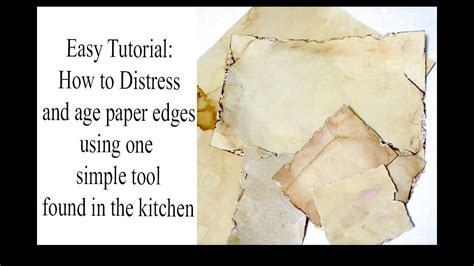How To Distress Paper
Ronan Farrow
Mar 31, 2025 · 3 min read

Table of Contents
How to Distress Paper: Achieve a Vintage, Worn Look
Distressing paper is a fantastic way to add character and authenticity to your crafting projects. Whether you're creating scrapbook pages, altered art pieces, or handmade cards, a distressed look can elevate your design. This guide will explore various techniques to distress paper effectively, achieving that coveted vintage, worn aesthetic.
Understanding the Desired Effect
Before diving into the methods, it's crucial to define the level of distressing you want to achieve. Do you want a subtly aged appearance, or a heavily worn, almost tattered look? This will dictate your choice of techniques and intensity.
Subtle Distressing vs. Heavy Distressing
Subtle distressing involves creating a slightly aged look, maybe a few soft creases or faded edges. This is ideal for projects where you want a hint of vintage charm without overpowering the overall design.
Heavy distressing involves creating a more dramatic effect, with significant tearing, creasing, and color fading. This is suitable for projects aiming for a dramatically aged, almost antique appearance.
Methods for Distressing Paper
Several methods can achieve a distressed look on your paper. Let's explore some popular options:
1. Sanding
This is a great technique for creating subtle distressing. Use fine-grit sandpaper to gently rub the edges of your paper, creating a slightly frayed and worn look. Focus on the corners and edges for a more natural effect. Remember to use light, even strokes to avoid tearing the paper.
2. Scorching
For a slightly more dramatic effect, try scorching the edges of your paper. Carefully hold a candle flame or lighter near the edges, allowing the paper to slightly brown and curl. Exercise extreme caution when working with fire; always have a fire extinguisher or water nearby. This method is best suited for heavier cardstock.
3. Ink Staining
Adding ink stains is a superb way to replicate age and weathering. Apply diluted ink with a sponge or brush, focusing on the edges and corners for a realistic look. Experiment with different ink colors to achieve unique effects. Coffee or tea stains can also achieve a similar result, adding a natural, antique look.
4. Crinkling and Folding
This is a simple yet effective technique to create creases and folds, giving the paper a worn, crumpled look. Simply crumple the paper in your hand and then carefully flatten it. You can repeat this process for a more pronounced effect. To control the folds, try using bone folder to crease the paper.
5. Tea Staining
Steep strong tea, let it cool, then submerge your paper. The longer the soak, the darker the color. Experiment with different tea types for unique shades. This creates a natural, aged look and works particularly well for achieving a vintage feel.
6. Using Distress Ink
Distress inks are specifically designed for creating a distressed look. Apply them with a sponge or dauber, focusing on the edges and corners, blending lightly to achieve a seamless effect. These inks are designed to adhere to the paper beautifully, making this a quick and easy technique.
Tips for Achieving the Perfect Distress
- Experiment with different techniques: Combine several methods to achieve a truly unique and layered distressed effect.
- Practice on scrap paper: Test your techniques on scrap paper before applying them to your final project.
- Less is often more: Start with subtle distressing and gradually increase the intensity as needed.
- Consider the paper type: Different paper types will react differently to distressing techniques. Heavier cardstock will hold up better to more aggressive techniques.
By mastering these techniques, you can transform ordinary paper into visually stunning pieces that add a touch of vintage charm to any project. Remember, practice makes perfect, so don't be afraid to experiment and find what works best for your creative style.
Featured Posts
Also read the following articles
| Article Title | Date |
|---|---|
| How To Get A Cdl License In Ct | Mar 31, 2025 |
| How To Drive A Boat In Rough Water | Mar 31, 2025 |
| How To Dress For A Spoon Shaped Body | Mar 31, 2025 |
| How To Extend A Garden Hose | Mar 31, 2025 |
| How To Find A Deer With No Blood Trail | Mar 31, 2025 |
Latest Posts
-
How Hospice Became A For Profit Hustle
Apr 04, 2025
-
How Historically Accurate Is The Nightingale
Apr 04, 2025
-
How High To Hang Clock With A 9 Foot Ceiling
Apr 04, 2025
-
How High The Moon Music Sheet
Apr 04, 2025
-
How High Should Transmission Temp Be
Apr 04, 2025
Thank you for visiting our website which covers about How To Distress Paper . We hope the information provided has been useful to you. Feel free to contact us if you have any questions or need further assistance. See you next time and don't miss to bookmark.
